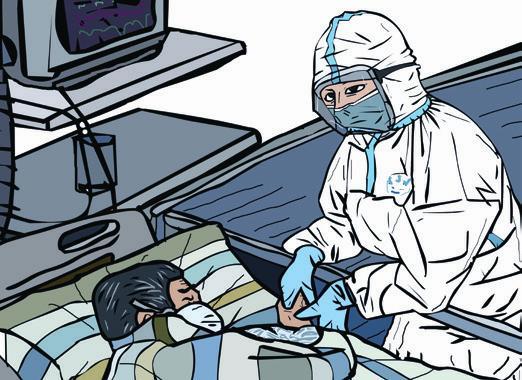The Battle Against the Novel Coronavirus Requires All Layers of Society

The outbreak of pneumonia caused by the novel coronavirus (2019-nCoV) came at a special time of the year in China, during the Spring Festival, the most important traditional holiday for Chinese. In order to curb the spread of the virus, the Chinese Government and all of Chinese society have mobilized, with the government making overall arrangements for staff and resource distribution, doctors and nurses fighting the outbreak round the clock, and the public being cooperative and helpful. In the time since the outbreak was made public, many people have expressed their views and hopes from different perspectives.
People first
Commentary (www.xinhuanet.com): China is mobilizing a nationwide response to prevent and control the 2019-nCoV outbreak. Government measures have been rapid, strong and effective because they enjoy the wide support of the people.
China has made many unprecedented moves, including extending the Spring Festival holiday, postponing the spring semester for schools and universities, and adopting transport restrictions in various areas. Wuhan, capital of Hubei Province in central China and the most affected area, has suspended all of its public transportation, including outbound channels at airports and railway stations.
All these decisions were made and implemented quickly.
Some measures inconvenience peoples lives, but authorities have every reason to be decisive because a national consensus has been reached: Containing the epidemic is of paramount importance and any difficulties must be overcome in this fi ght.
China has many advantages in the current battle, including its huge mobilization capacity, high technology and improved response mechanism. But most importantly, the nations strength and confi dence come from the steadfast practice of the principle that protecting the peoples interests is the highest priority.
When people are put first, they can be relied on. In a country of 1.4 billion people, all sectors of society are now in motion.
Doctors and nurses across the country are rushing to Wuhan. Civilian and military medical materials have been sent to hard-hit regions and more resources are on the way. Despite the Spring Festival holiday, factories race against time to produce face masks and protective clothing.
In Wuhan, all construction workers in the city were mobilized to build two makeshift hospitals to treat infected patients. Roundthe-clock construction made the miracle happen as the fi rst of the hospitals was put into use on February 3 as scheduled, with a capacity of 700 to 1,000 beds. The other“safety island,” with up to 1,500 beds, was completed on February 6.
Residents also have a role to play. People have postponed travel plans, staying at home to guard against potential infection. Grassroots communities are fully mobilized for personnel tracking and body temperature monitoring, while online platforms are promoting tips for virus prevention.
All these measures show the sound interaction between the government and the public.
Relying on the people also means being open to the people and respecting their right to know the truth.
Spreading panic can be more dangerous than the infection itself. Only by being open can panic be minimized. The timely, accurate and authoritative publication of information related to the epidemic is an important way to prevent spillover.
Authorities have warned that whoever values his own interests more than the interests of the people is at odds with the Communist Party of China (CPC) and the people. A health offi cial in Yueyang in Hunan Province, central China, is being investigated for untimely reporting of information related to epidemic prevention, the latest evidence that the red line of information transparency cannot be crossed.
Diseases respect no borders. Due to the way they can spread, it takes unifi ed, nationwide efforts to stop them, as China is doing now.
It is a war of the people and by the people. When the whole nation stands together, with scientifi c prevention and cures and precise policies, victory is assured.
Zhou Jun (www.xatvs.com): In these past weeks, people from all walks of life across the country have mobilized to fight against the outbreak of the 2019-nCoV. Medical staff from different provinces and the Peoples Liberation Army have come to Wuhan to help at local hospitals. Medical supplies are fast-tracked to the city, while food and produce are provided to locals at very low prices or free of charge. In a populous country of 1.4 billion people, the speed and effi ciency of relief efforts is based on Chinas current social and political systems.
A striking advantage of socialism with Chinese characteristics is the concentration of resources on major missions. President Xi Jinping stressed that peoples safety and health always come first. CPC members are taking the lead in efforts against the outbreak. Different areas instituted various schemes and measures suited to local situations for when people returned to their hometowns for the Spring Festival or for those who have been to Wuhan recently.
While the frontline battle against the virus is ongoing, the Chinese market is kept stable behind the lines so as to reassure the public and avoid panic. Tough punishment was imposed on profiteers who tried to make big money by sharply raising the price of scarce goods like face masks.
The domestic media is also actively involved in the fi ght against the virus, releasing information on resources and supplies and up-to-date developments in an open and transparent manner, so as to minimize public panic.
The safety of life has been put first as a consensus by all of society. Public activities that are common during the Spring Festival and the release of new movies have been widely canceled, and people chose to stay home instead of paying visits to friends and relatives, a custom during the Spring Festival. The Central Governments ordinances and measures are well thought out and are effectively being carried out. This is the power of Chinas socialist system, and it is where the Chinese peoples confidence in winning the anti-coronavirus battle originates.

Addressing problems
Fu Te (www.people.com.cn): The whole country is now focused on battling the virus. However, some people, or rather businesspeople, are spreading misinformation and creating panic among the public, so that they can make huge profits by pushing up the price of urgently needed goods. These practices not only fuel peoples anxiety but disrupt normal social order.
Rising confirmed infection cases are stoking the publics anxiety, so its natural that they want to protect themselves by buying face masks and medicine. It has been reported that some shops hiking prices tenfold were imposed huge fines. If most businesses do this at a time of crisis, everyone will suffer, including the unscrupulous businesspeople themselves.
Unfortunately, rumors are being spread on social media amid positive attitude and in- formation, such as fake hospital documents and screenshots of discussions among doctors. In the Internet era, the negative impact of misinformation can easily be multiplied. Particularly, at a critical moment such as this, rumor mongering can cause enormous damage. Everyone is obligated to stop the rumors they hear, or everyone will have to bear the disastrous consequences.
In order to encourage people who may be infected to go to hospital to get checked, the government has decided that the state will cover the fees, and no patient will have to worry about medical expenses.
The epidemic is not only testing the state system and medical staff, but also every member of society. In order to win this nationwide battle, no one should just stand by, let alone spread misinformation and create panic.
Ke Rui (www.gmw.cn): In the face of the unknown, Chinese medical staff are choosing to risk exposure to the new strain of coronavirus to treat the infected. They confront exhaustion and fear as they occupy the frontlines of the battle. Thus, as the rest of society hails them as heroes, it should also pay more attention to the severe environment they are struggling in. At the beginning of the outbreak, protective masks, goggles and other medical resources were in short supply in Wuhan and nearby cities, which meant that medical staff had to fi ght against health risks and death.
Currently, the battle is going on in an orderly way. Frontline medical staff have been working around the clock for many days now, so its time to give them a break so they can be better prepared for the ongoing battle. Some of them may even need psychological help.
A scientific and professional arrangement for their work is more important than ever before. Its unknown when the epidemic will be totally reined in, so its necessary to standardize the anti-virus work of medical staff, so that they can carry on the battle effectively.

